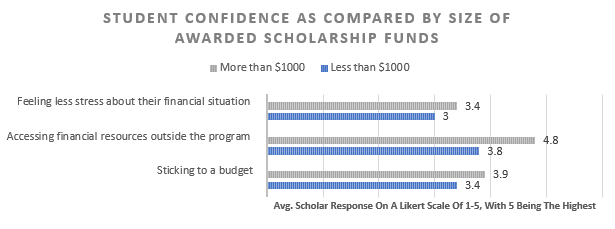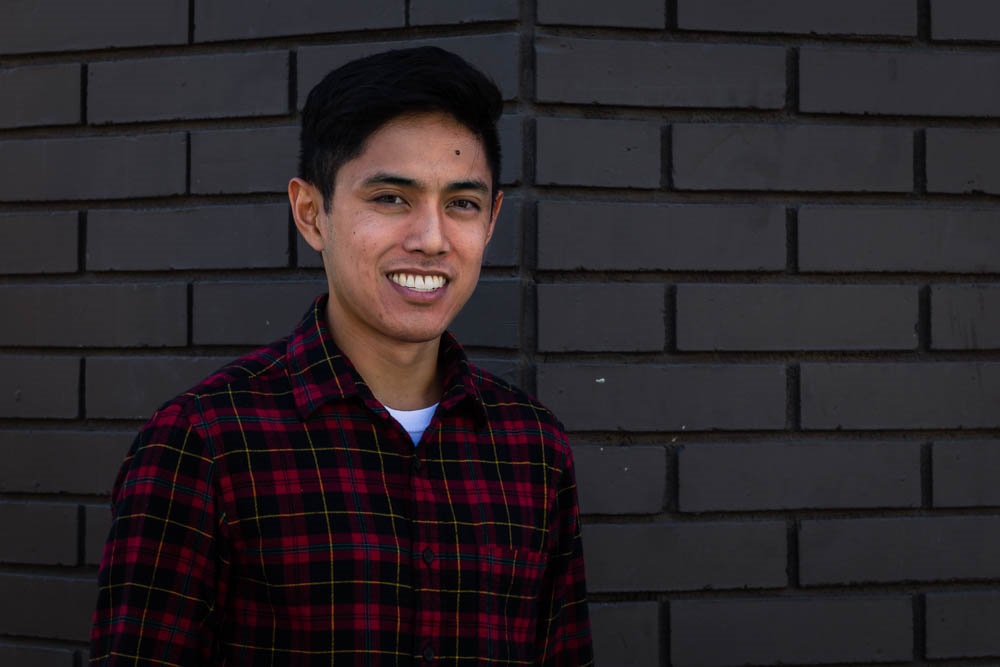To continually provide meaningful and evaluation-driven programming, Words Alive commenced on a seven-month Dialogues in Action (DIA) project to analyze the impact of our Words Alive Westreich Scholarship (WAWS) program using a blended qualitative and quantitative evaluation model. Through this process, we had an opportunity to view our program through the lens of the scholarship recipients, past and present, and their mentors to determine opportunities to enhance our program delivery.
Throughout this process, we identified eight findings and then brainstormed ways we could update and improve the program based on these findings. Here is the second finding!
An image of our scholar Damieon with his mentor David at the 2018 Words Alive Westrecih Scholarship Award Ceremony.
Raising the Bar: Communicated Expectations Improve Student Performance
Remaining eligible for the WAWS program requires that students regularly meet with their mentor, turn in academic progress reports, maintain a 2.0 GPA while enrolled in six or more credits and attend at least three of the professional development workshops offered throughout the program year. The program was intentionally designed with these requirements with the hope that students would develop habits of accountability and timely communication. We also hope that students will learn that they will face consequences if they do not complete program requirements in a timely manner. For example, a late fund request could result in not receiving their financial aid until the next month, or if a student does not attend the required number of workshops, they could lose eligibility for the scholarship for the next school year.
Through the interviews, we found that many students did, in fact, learn these skills. One scholar said very explicitly:
“I’ve learned to have more responsibility. There are different tasks we have to do to complete the scholarship, like submitting our grades and meeting with our mentor once a month. We have to write notes about what happened during the month. This responsibility I’ve learned also helps a lot in school and with my job.” – Scholar, age 23
Another scholar remarked:
“I’ve learned how to be on top of things, how to make deadlines and turn things in on time. It’s been good practice.” – Scholar, age 22
Yet another scholar said:
“The number one and most valuable thing I’ve learned is organization. To get the funds you’re being checked in on monthly and that forced me to change my life around and make education my number one priority.” – Scholar, age 25
A graphic that features a quote from a scholar. The quote is overlayed on top of an image of post-it notes. The quote says the following: “I’ve learned to have more responsibility. There are different tasks we have to do to complete the scholarship, like submitting our grades and meeting with our mentor once a month. We have to write notes about what happened during the month. This responsibility I’ve learned also helps a lot in school and with my job.” – Scholar, age 23
Clearly, the program requirements had the impact we intended. These requirements held students accountable and forced them to stay engaged with the program, and in the process, they learned responsibility, increased their communication skills and prioritized the scholarship and their education.
However, we also found that these requirements only had the impact we intended if the scholars understood and perceived them as mandatory. This past year it became clear to us that one scholar, who only met with his mentor three times, didn’t understand that attending the workshops was a mandatory requirement of the program.
In the survey, this scholar responded “moderately” to the statement: “I know what is expected of me by Words Alive and my mentor.” In this scholar’s interview, we saw a general lack of benefit from the WAWS program. When asked, “What changes are you seeing in your life as a result of the program?” he responded, “I haven’t really seen any changes in my life.” Comparing this answer with the other scholars, we see how the requirements being mandatory is absolutely essential.
Significance
It is significant that many scholars mentioned that the skills they learned because of these program requirements were then applied to other aspects of their life, such as school and work, which is imperative on their journey to adulthood.
We also found it interesting and surprising that while many scholars stated they had learned these skills (i.e. timely email communication, responsibility, organization, time management, etc.), they also often cited these same skills when asked about the recurring challenges they face. This points to the fact that these skills are a work in progress and take years to develop. The scholars’ self-awareness in their development is important because it shows they are capable of realizing where they started, what they have learned from the program and where they still have room for improvement.
Learn more about the Words Alive Westreich Scholarship program here!






















